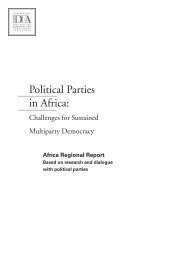Background Document - Danish Institute for Parties and Democracy
Background Document - Danish Institute for Parties and Democracy
Background Document - Danish Institute for Parties and Democracy
You also want an ePaper? Increase the reach of your titles
YUMPU automatically turns print PDFs into web optimized ePapers that Google loves.
portional representation in party lists such as in South Africa), <strong>and</strong> other <strong>for</strong>ms of<br />
electoral re<strong>for</strong>ms that support women’s participation at the local level.<br />
At the same time many discussants pointed out the need <strong>for</strong> a deeper underst<strong>and</strong>ing<br />
of the existing quota models <strong>and</strong> their impacts. It was pointed out that in<br />
some countries including Pakistan <strong>for</strong> instance there appeared to be a bias against<br />
those who were elected through quotas – a fact that would be true <strong>for</strong> other South<br />
Asian countries as well.<br />
A revealing study from Tanzania titled “Why women succeed in local politics”<br />
conducted by Anne Francis (undated) rein<strong>for</strong>ces that in this case the in<strong>for</strong>mal factors<br />
that enable women to succeed to political positions cannot be discussed in isolation<br />
from the <strong>for</strong>mal processes.<br />
In Tanzania the local elections are fought on a party basis <strong>and</strong> in fact the entire<br />
sample of councillors interviewed entered the political arena through the ruling party.<br />
From the research sample it was evident that all the women were long term party<br />
members including the women’s wings. Special seats were considered as a stepping<br />
stone to being a ward councillor, but the study indicated an ambivalence about how<br />
women themselves perceived this affirmative action <strong>and</strong> whether the special seat<br />
provision in this case was in fact more divisive <strong>and</strong> disempowering.<br />
In<strong>for</strong>mal factors were also at play with the study indicating that it helped to have<br />
a family member active in a party –however further investigation was needed to reveal<br />
the extent to which women mobilise these contacts <strong>for</strong> advice, funds or campaign<br />
strategies or simply use them to smoothen the route to power. The study further<br />
hypothesizes that a number of in<strong>for</strong>mal factors could be at play in explaining<br />
why women do succeed in local politics – among them activism/leadership in <strong>for</strong>mal<br />
community groups such as church, women’s groups school board, village committees<br />
or economic <strong>and</strong> self help groups, supportive family <strong>and</strong> positive role models.<br />
Interestingly in a very different setting in Norway where women entered the<br />
political process in a big way since World War II including at the local level, there<br />
was at least till 1971 a urban-rural divide with lower participation by women in the<br />
countryside where traditional sex role patterns were more firmly entrenched than<br />
in urban areas. Here too at least in the first three decades after World War II family<br />
engagement in politics <strong>and</strong> role models were factors that contributed to the women’s<br />
success in local politics. 6<br />
As a comparison between women in local politics in South Asia, East Asia <strong>and</strong><br />
Pacific regions with that of the south east Asian region indicates women are more<br />
likely to succeed if they have had a longer history of enjoying the right to vote <strong>and</strong><br />
participate, enabling political <strong>and</strong> electoral arrangements including affirmative action.<br />
Participation at the local level would also be related to the social <strong>and</strong> economic<br />
circumstances under which women live.<br />
While it may be easier <strong>for</strong> women to enter local politics as compared to national<br />
politics there are also <strong>for</strong>midable structural <strong>and</strong> institutional factors that hinder<br />
their participation. This largely emanates from patriarchy being the organisational<br />
principle at home <strong>and</strong> in the workplace across the world though in different degrees.<br />
Highly patriarchal societies en<strong>for</strong>ce rules, responsibilities <strong>and</strong> behaviour <strong>for</strong> women,<br />
6 Means 1973.<br />
“Decentralisation is seen as a key to women’s<br />
participation in local level politics.”<br />
WOMEN IN POLITICS DANISH INSTITUTE FOR PARTIES AND DEMOCRACY PAGE 28
















